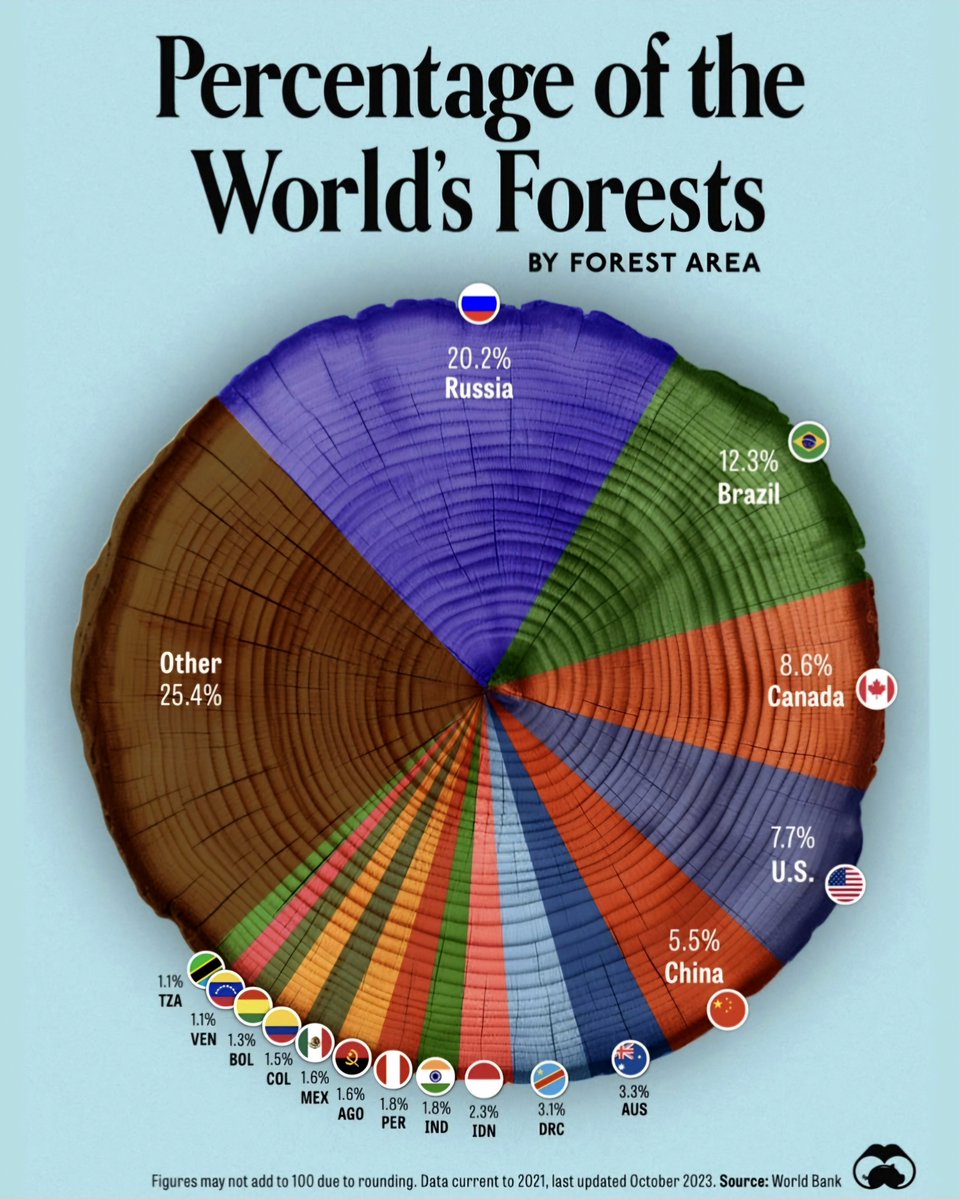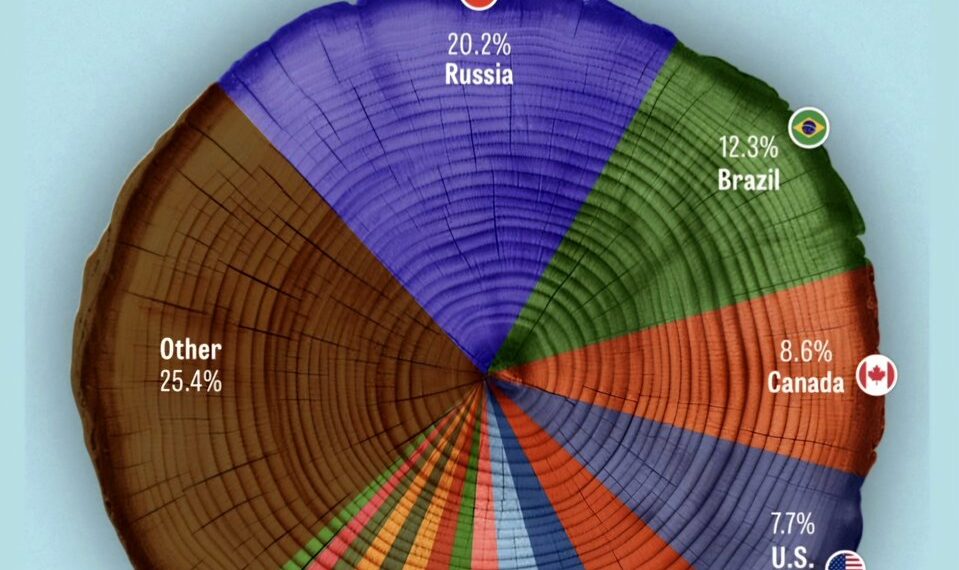Select Language:
Countries by Forest Area Share in the World
As global awareness of environmental sustainability and climate change rises, the importance of forests cannot be overstated. They are vital ecosystems that absorb carbon, provide habitat for countless species, and even regulate rainfall. According to the latest data from the World Bank, here’s a breakdown of the top countries contributing to the world’s forest area share.
1. Russia – 20.2%
With 20.2% of the world’s forest area, Russia leads the pack by a significant margin. The vast expanse of Siberian taiga and various forest types contributes to its substantial share. These forests play a crucial role in carbon sequestration and biodiversity, making them a keystone in global ecological balance.
2. Brazil – 12.3%
Brazil comes in second with 12.3% of global forest cover. The Amazon rainforest, often referred to as the “lungs of the Earth,” is a significant part of this figure. However, ongoing deforestation due to agriculture and logging poses a severe threat to its immense biodiversity and the ecological services it provides.
3. Canada – 8.6%
Canada ranks third with 8.6% of the world’s forests. Its boreal forests stretch across the northern part of the country, providing essential habitats for various species while acting as critical carbon sinks. These forests also support indigenous communities and economic activities like forestry and tourism.
4. United States – 7.7%
The United States holds 7.7% of the world’s forest area, characterized by diverse ecosystems ranging from temperate rainforests in the Pacific Northwest to the hardwood forests of the Appalachians. Conservation efforts and forest management practices have become increasingly important as pressure mounts from urban development and climate change.
5. China – 5.5%
China has made significant strides in forest restoration, boasting 5.5% of the world’s forest area. Initiatives like the “Great Green Wall” aim to combat desertification and improve air quality. However, rapid urbanization and industrial activities continue to put pressure on its forest resources.
6. Australia – 3.3%
Australia, with 3.3% of the world’s forests, showcases a unique mix of biodiversity, including eucalyptus forests and rainforests. The country faces challenges from invasive species and bushfires, which have been exacerbated by climate change. Ongoing conservation and restoration efforts are crucial to safeguarding its unique ecosystems.
7. Democratic Republic of Congo – 3.1%
The Democratic Republic of Congo (DRC) ranks next with 3.1% of global forest cover. Its rainforests are among the largest in the world and are home to a staggering array of wildlife. However, illegal logging and mining operations pose significant risks to these vital ecosystems.
8. Indonesia – 2.3%
Indonesia is responsible for 2.3% of the world’s forest area, primarily composed of tropical rainforests. These forests are critical for biodiversity and carbon storage but are threatened by agricultural expansion and illegal logging. Efforts to advance sustainable palm oil production are underway, albeit with challenges.
9. India – 1.8%
India’s forest area comprises about 1.8% of the global share, with a mix of tropical and subtropical forests. Important for both local communities and wildlife, protecting these forests is vital amidst increasing population pressures and developmental needs.
10. Peru – 1.8%
Peru shares its 1.8% forest cover with significant Amazonian regions. These forests are crucial for many indigenous communities and global biodiversity. However, deforestation driven by mining and agriculture threatens its ecological integrity.
11. Angola – 1.6%
Angola’s forests account for 1.6% of the global total. These woodland areas are not only critical for biodiversity but also for local economies. Restoration projects and conservation efforts are increasingly important in the face of deforestation.
12. Mexico – 1.6%
Mexico also holds 1.6% of the world’s forests, featuring a diverse landscape that includes tropical and temperate forests. Conservation initiatives focus on preserving its unique ecosystems, which are essential for both wildlife and local communities.
13. Colombia – 1.5%
Colombia’s forests contribute 1.5% of the global total, heavily populated by diverse flora and fauna. Ongoing conflicts and illegal activities have posed challenges for conservation, making sustainable management crucial for the future.
14. Bolivia – 1.3%
With 1.3% of the world’s forest area, Bolivia is home to rich biodiversity and unique ecosystems. Conservation efforts face challenges from agriculture and logging, necessitating sustainable practices to protect these vital resources.
15. Venezuela – 1.1%
Venezuela has 1.1% of the world’s forests, mainly consisting of tropical forests. Political and economic instability has hindered conservation efforts, making it essential to focus on sustainable management strategies in the region.
16. Tanzania – 1.1%
Tanzania rounds up the list with 1.1% of the global forest area, featuring diverse ecosystems such as the miombo woodlands. These areas are important for wildlife habitats and local communities but face challenges from deforestation and climate change.
🌎 Others – 25.4%
Together, other nations contribute approximately 25.4% of the world’s forest area. This collective share emphasizes the importance of global cooperation in forest conservation to combat climate change and biodiversity loss.
Conclusion
The evolution of forests worldwide is a reflection of human activity and natural processes. As our planet faces unprecedented challenges, safeguarding these rich ecosystems must be a priority for both current and future generations. Sustainable practices and international cooperation can help ensure these vital resources thrive for years to come.

Note: Figures may not add to 100% due to rounding. Data is current to 2021, last updated in October 2023.







